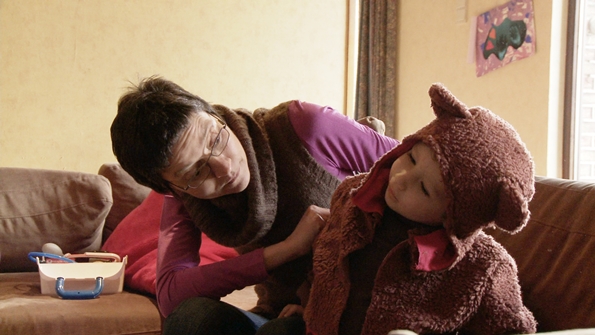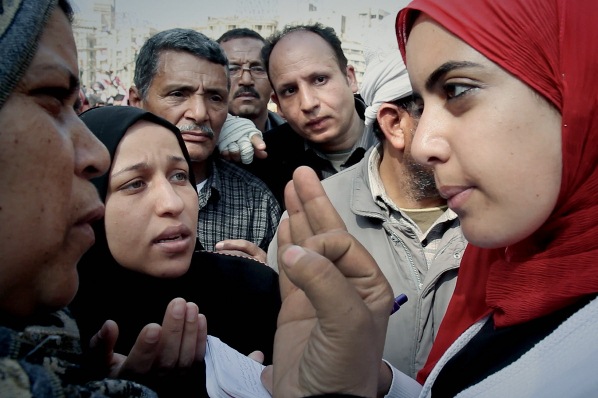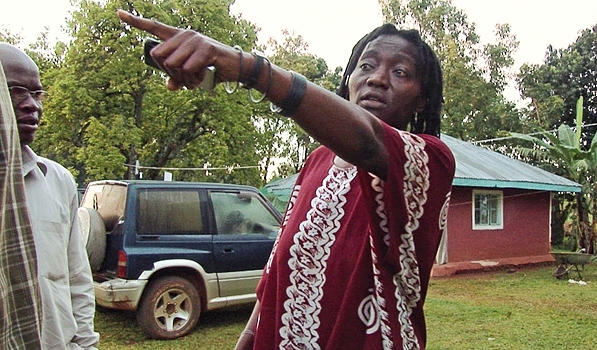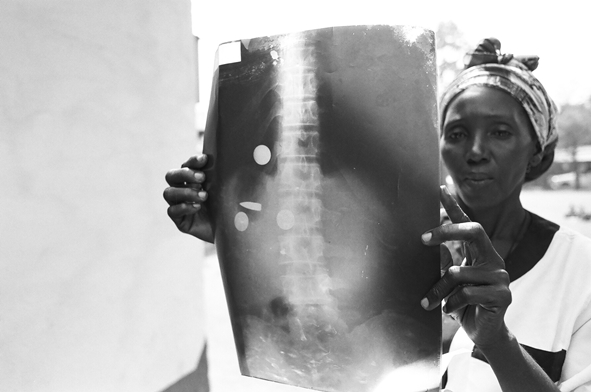Here’s a proposition worth arguing about: documentary films about women make for more interesting viewing. It’s an imperfect dichotomy, I accept. But, once one accepts that documentary film-making is at its core about serving up a testimony of life as lived, then I’d be happy to argue that the female perspective is on the whole the more interesting one.
Of the films centred around female protagonists that featured at the recently concluded DocAviv documentary film festival, the denominator shared by most was a preoccupation with the small picture, with the minutiae of everyday life. It’s a refreshing perspective, I think; it differs from the obsession with the big picture, the at times narcissistic presumption that it is always possible to distill the broader lessons of life through one person’s experience.

Take Epilogue, a slow and gentle and heartbreaking film from Belgium about the end of life. Neel is 50, and has been diagnosed with terminal cancer. Her approach to her forthcoming demise is phlegmatic, matter of fact. She wants to spend the rest of her life well, spending quality time with family and close friends; and to remain in control of her destiny, as far as she is able.
Euthanasia remains hugely controversial, and many films on the subject inevitably take on a polemic aspect. But Epilogue – which received an honorable mention at DocAviv – goes along a different path. The emphasis is on intimacy: Neel preparing herself and her family to face the inevitable with equanimity, the decision that she will bring things to an end herself, finding a way to negotiate these precious last few months without a guide to show the way. The filming is unobtrusive, understated, which heightens the emotional impact of the film – particularly when an unforeseeable event complicates the mise en scene.
Part of the challenge for the documentary film maker working with individuals rather than events is to find and mark the point where the personal meets the public. The individual is a part of a wider social community after all, and understanding the individual demands placing them within an accurate context. To its credit, Words of Witness does work hard to capture the specific social milieu of its principal. But the resulting product does neither subject nor context justice.

Heba is 22, a reporter for the English edition of the Egyptian newspaper Al-Masry Al-Youm. It’s early 2011; Mubarak’s government is teetering on the edge, and Heba has become energized – if not quite radicalized – in part through the constant chatter of social networks, she is slowly beginning to see her role as one of advancing – rather than merely reporting – the revolution.
These are beginnings of an interesting conflict between different worlds; the cool objectivity (supposedly) of journalism against the hot passion of activism, the social schism between the protected middle and the angry working classes. Heba’s mother warns her that “the revolution is no place for girls,” and her older sister, at first at least, is largely unmoved by the tumult on the streets. Heba is inquisitive, intelligent, and as she lears more about the excesses of the Mubarak regime for the first time, she volunteers herself to report from the frontline – potentially placing herself in personal danger.
There is a fascinating social documentary lurking in the background of Words of Witness, a consideration of the evolution of political awareness amongst the social classes better equipped to protect themselves against the excesses of Egyptian dictatorship. But it never quite comes to pass. Instead, we get to see Heba visiting a Coptic church at the centre of a religious storm, the headquarters of the Egyptian Secret Police, Tahrir Square itself, mediating in arguments and coaxing first person accounts from the combatants on the square. Isn’t she brave, one is tempted to think. Which, of course, neither does herself nor her political evolution any favors.

On the other hand, The Education of Auma Obama rejects the easy option of centering the film around the most famous bearer of the Obama family name, rather opting for a fascinating family portrait with the President’s half sister as the focus, and Obama himself restricted to a cameo. Auma grew up in the shadow of her brilliant but seemingly self-centered father; the complications of his domestic and professional lives intertwine with hers, sometimes threatening to strangle her sense of self identity before it has a chance to fully establish itself. In the event, it takes a move to Germany before she begins to understand herself as a woman, as an activist and as an African; the occasional intrusions from the 2008 Presidential elections are merely a distraction from a fascinating personal portrait.
If there is one dominant image of African politics in the public eye, it must be that of the Big Man; corpulent, corrupt, uncaring, despotic. From Sierra Leone to Zimbabwe, Congo to Central Africa, the continent is littered with the painful human cost to conflicts instigated and persecuted – often at a very safe remove – by men with little regard for the consequences of their actions.
The International Criminal Court was set up to find and try those guilty of the most egregious human rights violations. At the best of times, its a difficult job, physically and emotionally. There’s the need to secure physical evidence, interview witnesses, collate evidence into a coherent case, and after all that hope for the best. The wheels of justice turn slowly, they say; very few more so than those of the ICC.

Swiss director Heidi Specogna offers a revealing – and manifestly depressing – insight into the work of the ICC with the resolutely undogmatic Carte Blanche. Her film follows the work of the prosecutions team as they prepare the case to made against Jean-Pierre Bemba, a middle ranking Congolese politician – and, presumably, part time war lord – who stands accused of multiple human rights violations in the Central African Republic. The accusation is that, following the outbreak of violence in the CAR in 2002, Bemba gave the soldiers under his command carte blanche – hence the title – to kill, rape and pillage.
One wonders whether there was some deliberate design in the fact that beneath Jose Luis Moreno Ocampo, the flamboyant and media-friendly Chief Prosecutor of the ICC, the team working on the Bemba case are, in the main, understated women; prosecutors from Sierra Leone, Germany, Cameroon. They have the task of painstakingly accumulating and assessing the evidence in the field, shaping the case to be presented against Bemba. It’s often lonely, unheralded work. We get a particular sense of this when we follow Gloria Atiba Davies, an ICC Victims Expert to the Central African Republic, to collate witness statements that will form an integral part of the case. She’s done this many times before, one senses; in her hotel room, she unpacks a rice steamer and tins of sardines. She’d rather pack more food and less clothes, she remarks. When she interviews the victims, she maintains a scrupulous neutrality, necessary but remarkably difficult in the face of the allegations being made. Then she mentions, almost in passing, that she herself had been obliged to flee the threat of violence; after 20 years as a prosecutor in her native Sierra Leone, the threat of violence was brought to her doorstep. She left; she could. And it’s her job to try and find justice for those who couldn’t leave.

Home Movie – winner of the Israeli Film Competition – is billed as “the final chapter in the breakdown of the director’s family – one of many who did not survive the trials of immigration.” Which, with the deepest respect, it is anything but. True, it does tick the appropriate boxes. Three generations of a migrant family from the former Soviet Union? Tick. Divorces in the first and second generations? Tick. The occasional sense of social alienation, of seeking security and reassurance in known objects? Tick. But these only tell a part of the story.
The film centers around the Jerusalem flat that the director, Reuven Brodsky and his family lived in after their migration to Israel: His mother and father, he and his wife, their small son, and two dogs. Now, all have scattered, apart from the dogs. Mother and father have split up, are forging new relationships. Brodsky and his wife are divorced; they share custody of their son, and Brodsky is in a new relationship. Something needs to be done about the flat, it can’t be allowed to stand empty, it’ll be too expensive to do so. But memories are vested in the apartment, happy memories and sad ones. The sensible thing to do would be to renovate and rent out; but logic and emotion are not always the most comfortable of bedfellows.
The family, and the story, are held together by Liza, the family matriarch. A phase of her life is ending – she decides, during the course of the film, to close her hairdressing salon as well – but a new beginning beckons. It’s not that she lacks the romantic instinct: far from it, actually. But she wants to find a path through the thickets of emotion and into the clear daylight of an unencumbered life. It is a sweet, funny, touching and heartwarming film about family relationships, and I can’t recommend it too highly.
Watching Home Movie, I was struck by the fact that most men – this writer included, if he were to be honest with himself – expect to be a part of the big picture. It comes from the world of presumed entitlement, one where men get a fair crack of the whip more often than not. (Of course, there are all sorts of other issues that affect equality in the modern age: race and ethnicity, poverty, education and so on. But I’d argue that gender is the constant that cuts across all circumstances and all situations.) Women don’t have this luxury. Their truth lies in the small detail of everyday life. It’s a generalization, of course. But I think that some truth lies in it. And, in that sense, it’s why I think that documentaries about women make for more interesting viewing. They get just that bit closer to the truth about everyday life.





